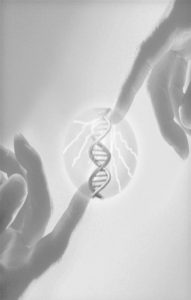 By Dr. Don Bierle, FaithSearch President
By Dr. Don Bierle, FaithSearch President
Atheists, secular humanists, and some others maintain “there is no God.” It is somewhat “faddish” among youth today, even those who grew up in the church, to announce that they are now atheists. Many other people, including Christians, struggle to gain certainty on the matter of God’s existence. Why the doubts?
Atheists deny the truth of the Bible, while doubts arise in others because they are shaken from their confidence in the clear declarations about God in the Bible. Neither seems to have considered that in addition to Scripture, God has provided external evidence to support His existence.
[A discussion of one external argument for God is included below. Other arguments will follow in future issues of the Paraclete.]
Nature – God reveals His fingerprints in the natural world.
The observation of complex and specified information in living forms (e.g., the message of DNA); the fine-tuned laws of the heavens; and the equations of physics; all are direct evidence of design and an Intelligent Designer.
Albert Einstein, as a result of his lifetime of advanced studies of the universe, stated, “The most incomprehensible thing about the world is that it is comprehensible” (emphasis added). Indeed, why should it be comprehensible if it is the result of chance, as atheistic evolution contends? Instead of chaos and unpredictability—as predicted if it has its origin in chance—the universe is orderly, fine-tuned, and conforms to mathematical equations and universal laws—as predicted if it has an Intelligent origin.
An example of intelligent design in nature is the DNA molecule, the chemical blueprint in each cell for every organism on the planet.
What are the odds that the 3.6 million letters in the Bible (or any other publication, say the dictionary or encyclopedia) could come together by chance alone to form its 66 books, 1,189 chapters, 31,173 verses, and 807,361 words? Everyone would agree this is absurd!
The forty-six chromosomes in body cells of humans consists of 3.2 billion letters (equal to the number of letters in 900 Bibles) organized into words and sentences in precise order (genes)—the exact instructions to produce a human baby! How can intelligent professors in universities across America continue to teach their students that this is the result of chance? Wouldn’t this also be absurd?
Another example of intelligent design is the human brain. It is the most complex and orderly arrangement of matter in the universe. The human brain contains at least 10 billion brain cells, with over 100 trillion neurological interconnections. If all these were laid end to end, they would circle the equator four times. The brain can hold the information content of 25 million books, filling a bookshelf 500 miles long.
Chance can no more evolve all this design than it could be responsible for the faces on Mt. Rushmore; nor could it develop a software program, nor a musical score.
It is scientific observations like this which support God’s revelation to the apostle Paul in Romans 1:19-20:
…what may be known about God is plain to them… For since the creation of the world God’s invisible qualities—his eternal power and divine nature—have been clearly seen, being understood from what has been made, so that men are without excuse.
Other biblical passages which affirm the evidence of God’s fingerprints in nature include: Job 12:7-10; Psalm 8; 19:1-4; 136:4-9; Jeremiah 5:21-24; Acts 15:16-17.
It should be noted that the external argument from scientific observations of nature do not reveal WHO God is, only that He must exist as an intelligent Creator. The knowledge of God’s identity (name) must come from another external evidence, namely, God’s fingerprints in history. That evidence will be discussed in the next Paraclete.



[…] Available on our Web site: See Issues from November 2018, January 2019, and March […]